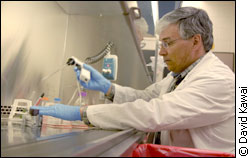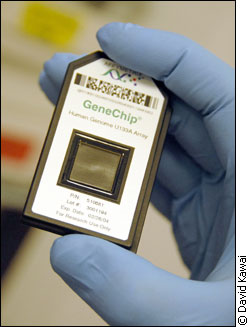
|
How can this happen? The drug has passed through clinical trials, safety and efficacy tests, and subsequently been approved by governmental regulatory agencies. Do pharmaceutical companies use a "hit or miss" philosophy in testing drugs? "Today you test 5,000 people for a specific drug and you are hoping to get a good result," says Dr. Martin Godbout, CEO and president of Genome Canada, referring to clinical trials. "But, in some cases a drug will work for a specific population, but not for others."
In the worst cases, a drug will pass clinical trials, but problems, or adverse drug reactions, will be discovered only when large groups of the general public are on the drug. A recent example involves Vioxx, Celebrex and other Cox-2 inhibitors that were deemed safe in clinical trials to reduce pain and inflammation caused by osteoarthritis. Patients only showed side effects of cardiovascular problems after the drug hit the market. The drugs were subsequently pulled. "The point is not the millions who benefit, the point is those who have side effects and die," says pharmaceutical company Roche Canada's CEO and president Ronnie Miller. "The model has to change, in terms of launching a drug, to be more specific about who's going to get benefits of it and who will not." Separating trial from error Pancreatic cancer is a particularly hard disease to treat, says Dr. Alan Mortimer, who directs Health Canada's Centre for Biologics Research in Ottawa. This is why Dr. Mortimer and his scientists are working to understand the disease at the genetic level.
"One per cent of (pancreatic cancer) patients have a genetic defect in their DNA which prevents them from being able to produce the specific protein needed for cell death, or apoptosis, to occur," he says. If the cell doesn't die, it mutates and eventually becomes cancerous, he explains. While one per cent of all pancreatic cancer patients may seem like a small size to worry about, scientists are recently discovering that susceptibility to many other diseases, especially cancers, are determined by a person's genetics. Take breast cancer, for example. According to Roche Canada's Miller, 20 to 30 per cent of breast cancer patients worldwide express a gene in their DNA called HER2. This usually reflects a very aggressive form of the disease that is difficult to treat. However, after post-market surveillance of the performance of the drug Herceptin, they found that HER2 positive patients responded particularly well to the drug, whereas patients without that genetic expression did not. In HER2 patients, Herceptin would reduce the chance of cancer coming back by about 46 per cent(ed: in relative terms, in absolute terms it is about 18% reduction )In light of this knowledge, doctors now offer a genetic test for breast cancer patients to see if Herceptin should be prescribed. "This is the first example of (genetic testing being done before writing a prescription)," said Miller. And, the general consensus is that Herceptin won't be the last example of such a drug, as the world enters the age of "personalized medicine". Tailoring a drug for your genes Dr. Mortimer is an optimist. He envisions a time in the future where drugs could be manufactured to treat a particular individual, based on that person's specific genetic makeup.
"We could pull the cells out of (a patient's) body, identify the part of the cell -the protein- that you don't have that (healthy people) do, which makes you more susceptible to a disease," he says. "Then, we could make a drug that works for you." This method of personalized medicine at the individual level might be far off, admits Dr. Mortimer, if at all possible at this stage, mostly because it would be very expensive to produce a drug for a single person and for a patient to pay for genetic profiling. However, it is a similar method to the way scientists from genetics projects around the world are attempting to discover how DNA factors in disease susceptibility for patients with cancer, cardiovascular disease and schizophrenia, to name a few widespread diseases. The cost of a cure Ideally, personalized medicine would be incorporated into clinical trial stages of the drug approval process. This means that genetic testing of patients in clinical trials would have to be done before administering samples of the drug. What is less than ideal about developing personalized medicine, however, is the cost. "Today, it takes a minimum of 12 to 15 years to put a drug on the market," says Dr. Godbout. "And it costs between 1.5 to 1.7 billion dollars." The cost is incurred along the stages of the drug approval process, much of it spent on clinical trial research to verify the safety of a drug.
Dr. Godbout used a hypothetical example to illustrate his point: There might be one drug for 10,000 patients with a specific disease, he explained. To verify the safety of that drug, it costs $1.5 billion. However, with personalized medicine research, perhaps 10 unique genetic sub-groups are isolated within these 10,000 patients, resulting in the development of new drugs that work for each respective genetic group. All of a sudden, in this example, the market for a single drug is cut down to 1,000 patients, yet each drug still costs the pharmaceutical company $1.5 billion to produce. In this situation, it would cost 10 times more to produce drugs for each genetic group with the disease, and thus, the cost for the treatment would increase tenfold.. This is part of the reason why Dr. Mortimer sees personalized medicine targeting cancer treatment before anything else. "Treatments for cancer can be quite expensive anyways. That's when it really would make sense to be able to make more effective drugs for smaller groups." Despite the cost, Dr. Mortimer says he expects to see genetic testing in clinical drug trials in Canada within the next couple of years – likely just enough time for Health Canada to finish drafting guidelines on how sponsors should use and submit such information in the drug approval process. Until then, one can only hope that advances in technology and scientific research make it more feasible and cost efficient to verify the safety and efficacy of a drug. "We' ve gotta come up with a way to be able to make personalized medicine possible," says Dr. Mortimer.
|
|
|


